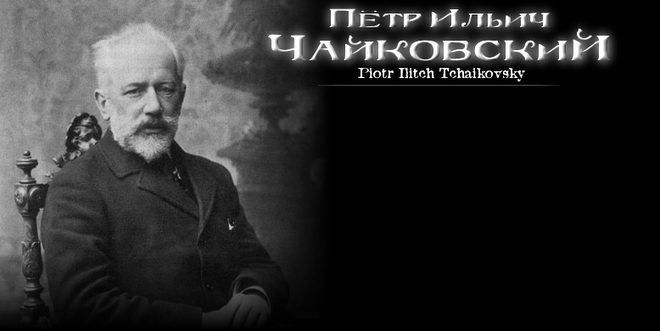
Op.1 - 2 Piano Pieces
Op.2 - Souvenir de Hapsal for Piano
Op.3 - The Voivode, Opera (1867-1868)
Op.4 - Valse caprice in D Major for Piano
Op.5 - Romance in F minor for Piano
Op.6 - 6 Songs for Voice & Piano
Op.7 - Valse-Scherzo in A Major for Piano
Op.8 - Capriccio in Gb Major for Piano
Op.9 - 3 Morceaux for Piano
Op.10 - 2 Morceaux for Piano
Op.11 - String Quartet No. 1 in D major (1871)
Op.12 - The Snow Maiden, Incidental Music
Op.13 - Symphony No.1 in G minor, Winter Daydreams (1866)
Op.14 - Vakula the Smith, Opera (1874)
Op.15 - Festival Overture on the Danish National Anthem(1866)
Op.16 - 6 Songs for Voice & Piano
Op.17 - Symphony No.2 in C minor, Little Russian (1872)
Op.18 - The Tempest, Symphonic Fantasia after Shakespeare (1873)
Op.19 - 6 Morceaux for Piano
Op.20 - Swan Lake, Ballet (1875-1876)
Op.21 - 6 Morceaux for Piano
Op.22 - String Quartet No. 2 in F major (1874)
Op.23 - Piano Concerto No. 1 in B-flat minor (1874-1875)
Op.24 - Eugene Onegin, Opera (1877-1878)
Op.25 - 6 Songs for Voice & Piano
Op.26 - Serenade Melancolique for Violin & Orchestra
Op.27 - 6 Songs for Voice & Piano
Op.28 - 6 Songs for Voice & Piano
Op.29 - Symphony No.3 in D Major, Polish (1875)
Op.30 - String Quartet No. 3 in E-Flat minor (1875)
Op.31 - Marche Slave for Orchestra (1876)
Op.32 - Francesca da Rimini for Orchestra (1876)
Op.33 - Variations on a Rococo Theme for Cello & Orchestra (1876)
Op.34 - Valse-Scherzo for Violin and Orchestra
Op.35 - Violin Concerto in D Major (1878)
Op.36 - Symphony No.4 in F minor (1877-1878)
Op.37 - Piano Sonata in G Major (1878)
Op.37a - The Seasons, for Piano (1876)
Op.38 - 6 Songs for Voice & Piano
Op.39 - Album pour Enfants, 24 Pièces Faciles for Piano
Op.40 - 12 Morceaux for Piano
Op.41 - Liturgy of St. John Chrysostom, for Unaccompanied Chorus
Op.42 - Souvenir d'un Lieu Cher for Violin and Piano (1878)
Op.43 - Orchestral Suite No.1 in D minor (1878-1879)
Op.44 - Piano Concerto No. 2 (1879)
Op.45 - Capriccio Italien for Orchestra (1880)
Op.46 - 6 Duets
Op.47 - 7 Songs for Voice & Piano
Op.48 - Serenade in C for String Orchestra (1880)
Op.49 - 1812 Overture (1880)
Op.50 - Piano Trio in A minor (1882)
Op.51 - 6 Morceaux for Piano
Op.52 - Russian Vesper Service (1881)
Op.53 - Orchestral Suite No.2 in C Major (1883)
Op.54 - 16 Children's Songs
Op.55 - Orchestral Suite No.3 in G Major (1884)
Op.56 - Concert Fantasia in G Major for Piano and Orchestra
Op.57 - 6 Songs for Voice & Piano
Op.58 - Manfred Symphony in B minor (1885)
Op.59 - Dumka, Russian Rustic Scene in C minor for Piano (1886)
Op.60 - 12 Songs for Voice & Piano
Op.61 - Orchestral Suite No.4 in G Major, Mozartiana (1887)
Op.62 - Pezzo capriccioso for Cello and Orchestra (1888)
Op.63 - 6 Songs for Voice & Piano
Op.64 - Symphony No.5 in E minor (1888)
Op.65 - 6 Songs for Voice & Piano
Op.66 - Sleeping Beauty, Ballet (1888-1889)
Op.67 - Hamlet, Fantasy Overture in F minor
Op.67a - Hamlet, Incidental Music
Op.68 - The Queen of Spades, Opera (1890)
Op.69 - Iolanta, Opera (1891)
Op.70 - String Sextet, Souvenir de Florence (1890)
Op.71 - The Nutcracker, Ballet (1891-1892)
Op.71a - The Nutcracker Suite
Op.72 - 18 Pieces for Piano (1892)
Op.73 - 6 Songs for Voice & Piano
Op.74 - Symphony No.6 in B minor, Pathétique (1893)
Op.75 - Piano Concerto No. 3, Posth. (1892)
Op.76 - The Storm, Concert Overture (1860)
Op.77 - Fate, for Orchestra (1868)
Op.78 - The Voyevoda for Orchestra (1891)
Op.79 - Andante and Finale, Posth. (1895)
Op.80 - Piano Sonata in C# minor
Works without Opus Number
Anastasie-Valse for Piano (1854)
Aveu Passionné for Piano (1891)
By the River, By the Bridge, Piano Piece on the Theme of a Folk Song (1862)
Cello Concerto (Unfinished)
Cherevichki (Revision of Vakula the Smith) (1885)
Concertstuck. for Flute and Strings, Posth.
The Enchantress (1885-1887)
Funeral March, On themes from the opera The Oprichnik (1877)
Impromptu for Piano in Ab Major (1889)
Impromptu-Caprice (1884)
The Maid of Orleans, Opera (1878-1879)
Mazepa, Opera (1881-1883)
Military March for Piano (1893)
Moment Lyrique for Piano (1892)
The Oprichnik, Opera (1870-1872)
Potpourri, On themes from the opera The Voevoda (1867-68)
3 Romances (Berceuse, On Chant Encore, Qu'importe) for Piano
Romeo & Juliet Fantasy Overture
50 Russian Folksongs for Piano 4-Hands
String Quartet in B-Flat Major, Posth. (1865)
Symphony in Eb Major (Unfinished)
Theme & Variations for Piano in A minor (1863-64)
Undina, Opera (Unfinished)(1869)
Valse-Scherzo for Piano in A Major (1889)
The Volunteer Fleet March ( Marsch der Marine-Freiwilligen), in C Major for Piano (1878)



